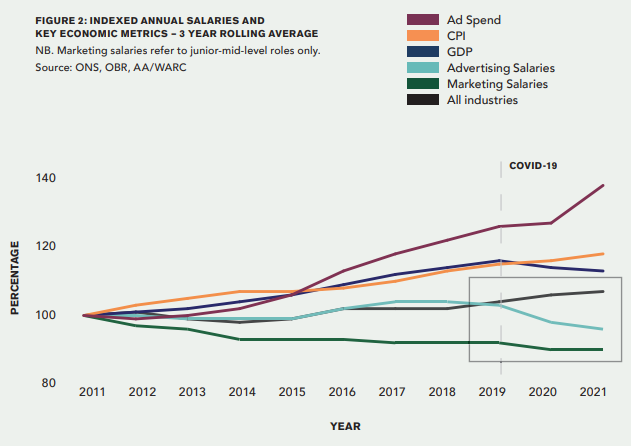The talent crunch shows it's time to increase salaries

Opinion: Career Leaders
Can agencies really expect to recruit, retain and incentivise their people without a rise in baseline salaries?
London room rents have risen by an average of 20% year-on-year, according to latest data from the property market and for the first time ever, no London postcode has an average monthly figure of less than £700.
Meanwhile, The Times reports that Britain suffered the biggest decline in workforce participation of any G7 economy during the pandemic, with 500,000 people fewer in active work.
Extraordinarily, The Guardian published an article this week about the travails of the advertising industry and the high rate of churn, especially in creative agencies, caused by the stresses of life in an industry where pressure has grown but fees haven’t.
Skating on thin ice
At the risk of stating the obvious, people are the most important part of any business. Buildings don’t build themselves and buses don’t run without drivers. Each job requires a talent and good people rise to the top in any walk of life.
The advertising and media industries may be a more extreme version of the general trend, and the level of skill and imagination needed in our line of business is undoubtedly more acute than in some other sectors, but we are not alone in perceiving our world as being in the middle of a talent crisis. You will find similar conversations happening in many sectors, and especially in a range of professional services.
The Confederation of British Industry (CBI) unsurprisingly echoes this in its exhortation to its members to invest more heavily in the development of talent.
It’s a generic, national problem.
And, yes, the CBI may not be the most credible of sources at the moment, but their five-point programme reflects the conversation about people development across most industries right now. The talent crunch is everywhere, and the starting salaries in the big law firms are further evidence of the competitiveness for bright new recruits.
We are fortunate that many brilliant people work in our industry and often do so for less reward than is available elsewhere. The calibre of talent especially in the media agencies has never been higher and the high quality of leadership is extraordinary.
We should expect better questions about media’s talent crisis
Yet we all know that we are skating on thin ice given the competing demands for talent across many industry sectors, exacerbated by unusual factors such as technology, Brexit, COVID and rampant inflation. Rent is a big factor, and home ownership is off the menu with interest rates at current levels.
It is heartening to see great work being done to improve matters. The Advertising Association has as usual excelled in its Investing In Our Talent’s Future report and Josh Krichefski, the new president of the IPA, has issued a stirring call-to-arms in his new People First manifesto.
Some of the proposed actions relate to the wellbeing of people within the industry (especially in, say, mental heath) and some are more generically geared to recruitment, but less time is being expended on some more basic ways to attract and retain highly talented people.
Falling behind
At the Lead conference in January, the results of an analysis of advertising industry salary data were presented, showing that our sector has fallen significantly behind in what it can offer its people.
This chart tells the story:

In short, remuneration in advertising has fallen sharply relative to adspend, the average cost-of-living and the ‘other industries’ average, especially since 2019, but consistently against CPI for several years.
Clearly the last year has been especially poor, with CPI figures in double digits, and it’s a fair assumption that the picture above has worsened in recent times. If anything the CPI numbers under-report the true cost increases in some key categories, such as accommodation costs in key cities.
This is especially severe when assessed against the growth in adspend, showing that people’s pay is not rising naturally with demand. In fact, the chart above underplays the disparity between effort and reward; managing demand for clients across multiple channels with a vast array of tools and techniques is more than just an ‘adspend issue’, it’s the workload involved in the range of disciplines needed in the multi-channel era, not least the amount of time and effort needed to analyse the data fire hose.
In fact, some studies suggest that advertising’s graduate starting salaries are some 9.4% behind the average for most industries and we will find it hard to build a long-term future if we don’t offer better terms to our most important recruits, the ones who can be trained well to improve standards in years to come.
It’s a sensitive area for the industry bodies who have to avoid perceptions of commercial pressure and also for their representatives, especially if they work for an agency group, but the pressing need for salary increases is only implicit in the recommended solutions to the talent crunch. Yet it is undoubtedly a key factor.
Can the industry afford to pay its people more?
The revenue and profits reported by the major holding companies for 2022 are impressively robust. While the independent agencies are not monitored as much, it’s a fair bet that their fortunes have held up with demand from most clients staying firmer than expected.
While the economic situation has deteriorated in 2023, there is an underlying strength to the market which suggests that marketing is no longer as closely tied to profit, and businesses in the digital age cannot afford to turn off the taps now that digital channels are so important for customer acquisition and turnover.
Of course, raising salaries isn’t that simple. Higher profit doesn’t automatically mean that remuneration can improve; after all, shareholders have certain expectations, but the agency groups risk alienating their people if robust profits aren’t reflected in payslips. Some groups are sharing the fruits of their profits, but this is often in the form of one-off payments that don’t help the underlying problem of low salaries.
Workloads in the digital age are increasing as media fragments and data multiplies: the pressure rises and people find there is too much month at the end of the money, especially where vacancies remain unfilled and people have to double up.
The cost of living is higher now relative to wages, and the more expensive items that compensate for the stress (e.g., flights, holiday accommodation) have all increased beyond average CPI. Mental health improves if there is a better balance between the effort involved in a high-stress industry and the cost of living, especially when basics such as energy bills are so high. People don’t mind working hard if they can enjoy the fruits of their labour and don’t have to worry excessively about disposable income.
The talent crunch is inextricably bound up with the plateau in earnings, so the question is whether the media agencies can afford not to increase pay.
This isn’t a short-term issue. The advertising and media industries should aim to compete and beat others in attracting fresh talent and rewarding its loyal employees.
Our industry competes with others and our attempts to improve our attractiveness are similar to other sectors. There is a generic demand for good people, especially with so much choice available. Salaries will have to rise to ensure people choose advertising and media, especially given the lower prestige that advertising commands in the digital age.
This may affect profit margins in the short-term, especially as advertisers drive down fees to improve their own business performance, but if we genuinely believe that better services come from better people and this leads to business success, then a degree of bravery is required. And this comes from the top.
One solution that we may not see is advertisers being prepared to pay more for the undoubted value that agencies bring. Procurement conferences would have you believe that clients are adept at assessing value and paying more for better, but when the chips are down, procurement departments are incentivised to shop around for lower costs. Pitches rarely involve clients paying more for more.
***
With the cost-of-living increasing for people, especially in London, and with better pay available else (and maybe even a better work/life balance), can agencies really expect to recruit, retain and incentivise their people without a rise in baseline salaries?
We like to trumpet our contribution to clients’ business fortunes through our skill, experience and expertise, especially in the more technical areas of digital media, but we haven’t yet turned that into value for our people.
So let’s aim to project our self-confidence by paying our people more and making our industry more competitive and more durable.
 Nick Manning is the co-founder of Manning Gottlieb Media (now MGOMD) and was CSO at Ebiquity for over a decade. He now owns a mentoring business, Encyclomedia, offering strategic advice to companies in the media and advertising industry. He writes for The Media Leader each month — read his articles here.
Nick Manning is the co-founder of Manning Gottlieb Media (now MGOMD) and was CSO at Ebiquity for over a decade. He now owns a mentoring business, Encyclomedia, offering strategic advice to companies in the media and advertising industry. He writes for The Media Leader each month — read his articles here.





